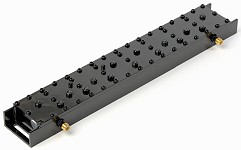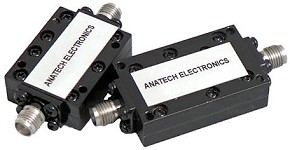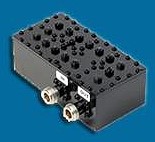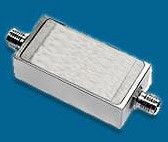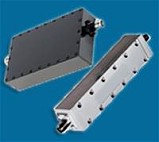Anatech Electronics March 2023 Newsletter |
||

Press Release Archives: 2024 | 2023 | 2022 | 2021 |2020 2019 | 2018 | 2017 | 2016 | 2015 2014 | 2013 | 2012 | 2011 | 2010 2009 | 2008 | 2007 | 2006 | 2005 Content is copyright of company represented. Page format, custom text and images are RF Cafe copyright - do not distribute.
Sam Benzacar of Anatech Electronics, an RF and microwave filter company, has published his March 2023 newsletter that features his short op−ed entitled "Healthcare Industry IoT Security Under Threat," which discusses some of the issues compromising not just healthcare privacy, but the whole Internet of Things (IoT) effort. The fact is your healthcare records have been anything but secure and private for a long time. The Health Insurance Portability and Accountability Act of 1996 (HIPAA), which is responsible for the glass or Plexiglas barriers with the small transaction opening installed at the reception desks at doctor and dentist offices (many of us are old enough to remember when they went up), was supposed to make people feel that their medical history was being protected against prying eyes, physically and digitally. That has been as effective as requiring everyone to wear a cloth facemask to protect them against a virus. My guess is that nearly every form of personal information is available on the black market from databases breached by not just outside black-hat operators, but by government and private corporate employees seeking financial payouts. Information fences (criminal buyers and sellers) are fairly easily contacted if you seek such information. Consider how prolifically your e-mail and other non-medical information is made available to concerns with enough money to buy it. A Word from Sam Benzacar - Healthcare Industry IoT Security Under Threat
Although IoT allows healthcare professionals to access and exchange patient data and monitor patient health remotely, it also poses significant security threats that can compromise patient privacy, data confidentiality, and system integrity. Healthcare industry is the second-most attacked industry, with the number of ransomware attacks doubling between 2016 and 2021. The result was the theft of massive disruption of healthcare facilities and the theft of millions of patient records. Wireless networks are inherently less secure than wired networks (although they can also be hacked), and data transmitted over wireless networks can be intercepted by attackers who gain access to the network. Another concern is the proliferation of unsecured devices that lack adequate security measures, making them easy targets for cyberattacks. When these devices are connected to the healthcare network, they can provide a potential entry point for attackers to gain access to sensitive patient data and other healthcare information. The issue hasn't escaped attention from agencies such as the FDA, federal law enforcement, and Congress, and the first steps toward addressing healthcare security have been taken. Since 2014, the FDA has been issuing recommendations concerning cybersecurity for the healthcare industry, each one updating its predecessor to address the rapidly evolving threat landscape. This work resulted in a 49-page document called "Cybersecurity in Medical Devices: Quality System Considerations and Content of Premarket Submissions and Food and Drug Administration Staff." It is very comprehensive and focuses on the deployment of mitigations using a total product lifecycle (TPLC) approach and recommends dozens of actions the industry should adopt. The Consolidated Appropriations Act for 2023 (the $1.7 trillion omnibus bill) that funds the federal government through September includes a major addition to the amendments to the FD&C Act that directs manufacturers of "cyber devices" to develop plans to "monitor, identify, and address" cybersecurity vulnerabilities of marketed devices "in a reasonable time." Unfortunately, in the race to get the FDA funded for FY 2023, the agency had to drop almost all its medical device cybersecurity requirements because Senate Republican leadership felt there was not enough time for legislators to review them. What remains in the budget are FDA requirements for medical device manufacturers to ensure their devices meet minimum standards for cybersecurity and submit a plan to the FDA to monitor, identify, and address post-market cybersecurity vulnerabilities and exploits. They must also submit plans to the FDA for every new product application that demonstrates how the device will address vulnerabilities. Patches to post-market software and firmware are also required. Carriers Say Fixed Wireless Access Can't Match Cable Broadband
Report: Feds Not Following Rules on Call Interception
MIT Team Finds New Way to Block Interference
Researchers Map People Using a Wi-Fi Router
Anatech Electronics Introduces a New Line of Suspended Stripline and Waveguide Type RF Filters
Check out Our Filter Products
Cavity Band Pass Filters LC Band Pass Filters Cavity Bandstop/Notch Filter About Anatech Electronics Anatech Electronics, Inc. (AEI) specializes in the design and manufacture of standard and custom RF and microwave filters and other passive components and subsystems employed in commercial, industrial, and aerospace and applications. Products are available from an operating frequency range of 10 kHz to 30 GHz and include cavity, ceramic, crystal, LC, and surface acoustic wave (SAW), as well as power combiners/dividers, duplexers and diplexers, directional couplers, terminations, attenuators, circulators, EMI filters, and lightning arrestors. The company's custom products and capabilities are available at www.anatechelectronics.com. Contact: Anatech Electronics, Inc.
Posted December 22, 2022 |
||

 By Sam Benzacar
By Sam Benzacar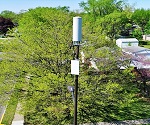 The top executives at America's two leading cable companies Comcast and Charter
say they think fixed wireless access will never be as good as the cable industry's
advanced DOCSIS 4.0 networks. Regardless, Verizon and T-Mobile's collective FWA
services accounted for more than 90% of growth in the fourth quarter of 2022. Charter
pointed to a test conducted by OpenSignal last year showing that 5G FWA falls short
of cable broadband in speed and latency. Not noted, however, was that for most people,
gigabit-per-second data rates aren't necessary, and the lower speeds (and cost)
of FWA are making it an appealing offering.
The top executives at America's two leading cable companies Comcast and Charter
say they think fixed wireless access will never be as good as the cable industry's
advanced DOCSIS 4.0 networks. Regardless, Verizon and T-Mobile's collective FWA
services accounted for more than 90% of growth in the fourth quarter of 2022. Charter
pointed to a test conducted by OpenSignal last year showing that 5G FWA falls short
of cable broadband in speed and latency. Not noted, however, was that for most people,
gigabit-per-second data rates aren't necessary, and the lower speeds (and cost)
of FWA are making it an appealing offering. 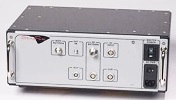 According to a government audit, the Secret Service and Immigration and Customs
Enforcement agencies aren't following the law and official policy regarding the
use of cell-site simulators. These devices, typically called IMSI Catchers, make
user devices believe they are connecting to their network but are actually decoys
set up by law enforcement to intercept metadata or communications and determine
a phone's location. The agencies are supposed to get a court order or use a "pen
register" to record incoming and outgoing calls but in many cases have not been
doing so.
According to a government audit, the Secret Service and Immigration and Customs
Enforcement agencies aren't following the law and official policy regarding the
use of cell-site simulators. These devices, typically called IMSI Catchers, make
user devices believe they are connecting to their network but are actually decoys
set up by law enforcement to intercept metadata or communications and determine
a phone's location. The agencies are supposed to get a court order or use a "pen
register" to record incoming and outgoing calls but in many cases have not been
doing so. 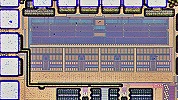 Researchers at MIT have developed a device that can actively block high levels
of interference with cellular and other wireless signals without traditional filtering
and is small enough to be integrated into mobile devices. It's based on a "mixer-first"
architecture in which unwanted frequencies are removed before the signal is decoded.
It also uses a digital signal processing technique called block-digital filtering
that employs capacitors connected in parallel or in sequence to block harmonics.
Researchers at MIT have developed a device that can actively block high levels
of interference with cellular and other wireless signals without traditional filtering
and is small enough to be integrated into mobile devices. It's based on a "mixer-first"
architecture in which unwanted frequencies are removed before the signal is decoded.
It also uses a digital signal processing technique called block-digital filtering
that employs capacitors connected in parallel or in sequence to block harmonics.  A team at Carnegie Mellon University has created a way to detect three-dimensional
shape and movements of human bodies in a room using only Wi-Fi routers by employing
a technique called DensePose. This technology maps pixels on the surface of a human
body in a photo and was developed by Facebook's AI researchers. After this, a deep
neural network maps the signals' phase and amplitude to coordinates on human bodies.
Other researchers at MIT in 2013 found a way to use wireless signals to see through
walls, and in 2018 another MIT team used Wi-Fi to detect people in another room
and translate their movements to walking stick figures. The Carnegie Mellon researchers
believe Wi-Fi signals can function as a ubiquitous substitute for standard RGB cameras
for sensing people in a room. The benefit of Wi-Fi is that it overcomes obstacles
like poor lighting and occlusion that degrade regular camera lenses.
A team at Carnegie Mellon University has created a way to detect three-dimensional
shape and movements of human bodies in a room using only Wi-Fi routers by employing
a technique called DensePose. This technology maps pixels on the surface of a human
body in a photo and was developed by Facebook's AI researchers. After this, a deep
neural network maps the signals' phase and amplitude to coordinates on human bodies.
Other researchers at MIT in 2013 found a way to use wireless signals to see through
walls, and in 2018 another MIT team used Wi-Fi to detect people in another room
and translate their movements to walking stick figures. The Carnegie Mellon researchers
believe Wi-Fi signals can function as a ubiquitous substitute for standard RGB cameras
for sensing people in a room. The benefit of Wi-Fi is that it overcomes obstacles
like poor lighting and occlusion that degrade regular camera lenses. 